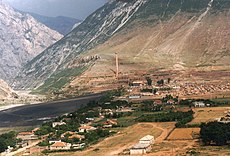
Back قرار مجلس الأمن التابع للأمم المتحدة رقم 1203 Arabic Resolució 1203 del Consell de Seguretat de les Nacions Unides Catalan بڕیارنامەی ١٢٠٣ی ئەنجومەنی ئاسایش CKB Resolution 1203 des UN-Sicherheitsrates German قطعنامه ۱۲۰۳ شورای امنیت FA Resolusi 1203 Dewan Keamanan Perserikatan Bangsa-Bangsa ID قطعنومه ۱۲۰۳ امنیت شورا MZN Resolutie 1203 Veiligheidsraad Verenigde Naties Dutch Резолюция Совета Безопасности ООН 1203 Russian 联合国安全理事会第1203号决议 Chinese
| UN Security Council Resolution 1203 | ||
|---|---|---|
 Kosovo refugee camp in Kukës, Albania | ||
| Date | 24 October 1998 | |
| Meeting no. | 3,937 | |
| Code | S/RES/1203 (Document) | |
| Subject | The situation in Kosovo | |
Voting summary |
| |
| Result | Adopted | |
| Security Council composition | ||
Permanent members | ||
Non-permanent members | ||
| ||
United Nations Security Council resolution 1203, adopted on 24 October 1998, after recalling resolutions 1160 (1998) and 1199 (1998) on Kosovo, the Council demanded that the Federal Republic of Yugoslavia (Serbia and Montenegro) comply with previous Security Council resolutions and co-operate with the NATO and Organization for Security and Co-operation in Europe (OSCE) verification missions in Kosovo.[1]
The resolution was triggered by the Gornje Obrinje massacre.[2]
On 16 October 1998 an agreement was signed in Belgrade between the Federal Republic of Yugoslavia and the OSCE providing for the establishment of a verification mission in Kosovo, with aerial verifications over Kosovo agreed the previous day.[3] The Secretary-General Kofi Annan was to send a mission to the Federal Republic of Yugoslavia to assess the situation on the ground in Kosovo.
The Security Council stated that the conflict in Kosovo should be resolved peacefully and that the territory be given greater autonomy and meaningful self-administration. Meanwhile, violence, terror and the supply of arms and training to terrorists in Kosovo in pursuit of political goals was condemned. There was concern that independent media outlets in the Federal Republic of Yugoslavia had been closed in addition to the impending humanitarian catastrophe in Kosovo.[4]
Viewing the conflict as a threat to international peace and security and acting under Chapter VII of the United Nations Charter, the resolution demanded that FR Yugoslavia immediately and fully comply with the agreements with NATO and the OSCE. The Kosovo Albanian leadership also had to comply with the agreements and previous Security Council resolutions. Both parties were also urged to engage in dialogue to resolve the crisis and co-operate with international efforts to improve the humanitarian situation. The Kosovo-Albanians had to renounce terror and pursue their goals peacefully and it was reaffirmed that all refugees had the right to return home.
Finally, it was stated that any crimes committed against the population were to be investigated by the International Criminal Tribunal for the former Yugoslavia and international assistance to this end was requested.
Resolution 1203 was adopted by 13 votes to none against, with two abstentions from China and Russia who opposed the use of force.[5] China was also against a resolution that would pressure the internal affairs of the Federal Republic of Yugoslavia and Russia stated that the resolution had not taken into account positive developments in Belgrade.[6]
- ^ "Security Council demands Federal Republic of Yugoslavia comply fully with NATO and OSCE verification missions in Kosovo". United Nations. 24 October 1998.
- ^ "General Wesley Clark". Frontline. PBS. Retrieved 4 July 2012.
In September 1998 there was an absolutely dreadful massacre at a place called Obrinje. Do you remember that? -- I do remember it. It's what really triggered the UN Security Council resolution.
- ^ Michael Waller; Kyril Drezov; Bülent Gökay (2001). Kosovo: the politics of delusion. Routledge. p. 47. ISBN 978-0-7146-5157-6.
- ^ Krieger, Heike (2001). The Kosovo conflict and international law: an analytical documentation 1974–1999. Cambridge University Press. p. 505. ISBN 978-0-521-80071-6.
- ^ "UN demands action over Kosovo". BBC News. 24 October 1998.
- ^ Guicherd, C. (1999). "International law and the war in Kosovo". Survival. 41 (2): 19–34. doi:10.1093/survival/41.2.19.